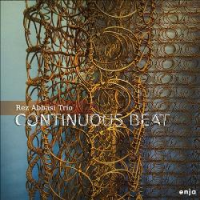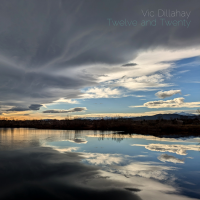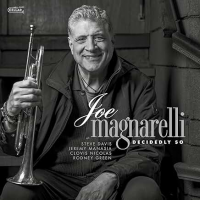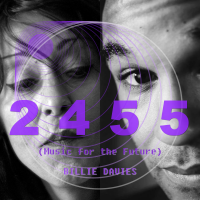Home » Jazz Articles » Multiple Reviews » Bill Frisell: Live Download Series #1-13
Bill Frisell: Live Download Series #1-13

One of the biggest problems facing contemporary jazz musicians is that they often have far more projects on the go than could ever be recorded and released commercially by conventional record labels—even small and relatively responsive indie labels. Special projects abound, or personnel changes for a tour are forced when members of a regular group are unavailable, the plight of the 21st century working musician being how to remain viable and available. Of course, it's not necessarily a problem, because regardless of the reason, it means that today's leader ends up touring in more combinations than could ever be documented through normal channels—and some of these special, one-time/one-tour projects yield tremendous gold—even leading to further collaboration. If only there was a way the pathological fan could hear all of it.
Fans of sonic guitar sculptor Bill Frisell can rejoice, as the Live Download Series is making available a growing catalog of high quality soundboard recordings of performances by groups that have been documented on commercial albums, like the guitarist's first quartet, with cellist Hank Roberts, bassist Kermit Driscoll and drummer Joey Baron; the sextet responsible for one of Frisell's compositional high water marks, This Land (Elektra/Nonesuch, 1994); and his early 21st century trio, with bassist Tony Scherr and drummer Kenny Wollesen. But as thrilling as it is to hear a 1989 performance by Frisell and his quartet, performing music from Rambler (ECM, 1984), Lookout for Hope (ECM, 1988) and Before We Were Born (Elektra/Nonesuch, 1989), it's even more exciting to find the hidden gems—previously unrecorded groups like Frisell's trio with organist Sam Yahel and drummer Brian Blade; or very limited-run tours like a 2005 performance from London, England's The Barbican, where Frisell, violinist Jenny Scheinman and guitarist Greg Liesz delivered a stunning tribute to The Beatles' John Lennon.
Frisell's sole solo album to date, Ghost Town (Nonesuch, 2000), was a studio concoction that relied on the guitarist's ability to overdub layers of instruments. As undeniably good as that album is, it can't possibly convey the beauty of Frisell's solo shows where, alone onstage—in real time, and with nothing but a guitar, two amps, and a mixed bag of effects—he builds sound worlds as distinctive as his idiosyncratic approach to harmony and melody, and his skewed but somehow reverent interpretation of own compositions, and everything from jazz standard to roots Americana music.
Culled, as they are, from soundboard recordings, Frisell's Live Download Series also transcends the quality of the majority of bootlegs out there. With a CD label, cover art, tray cards and, on occasion, additional video content, the series is offered in three formats: MP3 and AAC for those OK with some degree of compression, to reduce download time and storage space; and, for the compression-averse, a slightly more expensive but lossless FLAC format, to provide CD quality sound (free FLAC-to-WAV converters are readily available on the web). Beginning in November, 2008, the series has ramped up to the point where, with 13 downloadable shows released to date—in addition to outtakes from the Bill Frisell, Ron Carter, Paul Motian (Nonesuch, 2006) sessions and additional recordings from the live shows used for East/West (Nonesuch, 2005)—Songline/Tonefield Productions is now releasing a new show roughly every two months. The most recent download is from a particularly strong 2000 show with Frisell's then-new trio, with Scherr and Wollesen.
For pathological Frisell followers, there's not a weak performance amongst the bunch; for more casual fans, there's the opportunity to cherry-pick, to check out specific groupings or repertoires of interest.
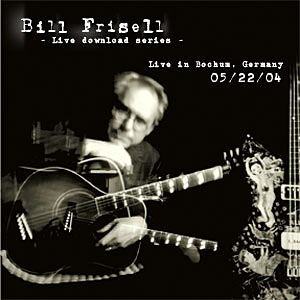 Bill Frisell #001: Recorded Live in Bochum, Germany 05/22/04 Songline/Tonefield Productions 2009
Bill Frisell #001: Recorded Live in Bochum, Germany 05/22/04 Songline/Tonefield Productions 2009The Live Download Series kicks off with a group that's never seen the light of day on record, but consists of a combination of longtime friends and then-new acquaintances, who would go on to become regulars in the ensuing years. 2004 may have been the year of Unspeakable (Nonesuch), Frisell's Grammy Award-winning, turntable and sample-driven collaboration with producer Hal Willner, but there's none of that album's material to be found on this performance with Jenny Scheinman, cornetist Ron Miles, bassist Viktor Krauss and drummer Matt Chamberlain.
There's the opportunity to hear an early version of the vamp-driven "Lazy Robinson," which wouldn't appear on a commercial release until 2008's History, Mystery (Nonesuch); and a lengthy version of "Blues for Los Angeles" that, with Miles' recklessly visceral opening solo, transcends the original trio version on 1998's Gone, Just Like a Train (Nonesuch), and also suggests why, with his lazy, behind-the-beat drumming, Frisell would reunite with Chamberlain for 2007's experiment in sonic collage, Floratone (Blue Note), that's due for a second installment, sometime in 2011.
The quintet's version of the folksy "Lonesome" is more buoyant than either the original, acoustic guitar-driven version on Lookout for Hope, or the more electrified take on Gone, Just Like a Train, with Scheinman's solo an early reason why she'd quickly become a regular collaborator. There's also an early appearances of alt-folker Lucinda Williams' lyrical "Ventura," which has never appeared on a commercial Frisell release; ditto Bob Dylan's "Masters of War," which shows up on other Download Series releases. Driven by Chamberlain's firm backbeat, it's a showcase for Frisell's remarkable interpretive ability to take a simple song and, through his quirky, outré harmonies and jagged, distorted tone, turn it into a potent show-stopper and set closer.
 Bill Frisell #002: Recorded Live in San Francisco, CA 03/16/07 Songline/Tonefield Productions 2009
Bill Frisell #002: Recorded Live in San Francisco, CA 03/16/07 Songline/Tonefield Productions 2009 Recorded at Grace Cathedral in San Francisco, the second installment of Frisell's Download Series presents the guitarist at his most intimate...and most vulnerable. By 2007, Frisell had honed his ability to self-accompany with looping to such a sophisticated extent that it's hard to believe there's only one guitarist delivering a subtle but attention-grabbing version of Curtis Mayfield's classic, "A Change is Gonna Come." Frisell's remarkable patience allows the song's form to evolve slowly, almost inevitably, with his warm tone—expanded by plenty of reverb—making even the moments where he is playing without loops rich and room-filling, even at low volumes.
Since Frisell released the award-winning Nashville—an album that drew no small line in the sand for the guitarist, as he seemed to desert the more angular direction of his previous albums in favor of eminently lyrical and structurally simplified Americana (there is, however, often far more to his seemingly simple music than meets the eye). Frisell comes under fire, periodically, for "deserting jazz," even though it would have been impossible to record an album like Nashville without the broader vernacular he'd developed from his earliest days, with saxophonist Jan Garbarek and bassist Arild Andersen. He continues to pay tribute to personal favorites, like pianist Thelonious Monk, on albums like Bill Frisell, Ron Carter, Paul Motian, and here he delivers a solo version of "Crepuscule With Nellie" that's homage in its wry edge, but all Frisell in its chocolaty-rich warmth. There are no loops here; just Frisell with no shortage of reverb to fatten up the sound, managing a remarkable feat of self-accompaniment, largely through implication. Frisell similarly turns Monk's "Evidence" into a surprising mélange of dense voicings and languid single-note phrases, later in the set.
Frisell returns to Dylan with a medley that combines a bluesier acoustic version of "Masters of War," bringing a different kind of energy to this protest song, and an initially atmospheric take on "A Hard Rain's Gonna Fall," underscored by an ethereal acoustic loop and a drop-D tuning that gives it a hint of Celtic flavor, before finding its way to the familiar melody. Frisell also turns to Stephen Foster for a look at "Hard Times," first recorded by the guitarist on the rather unexpected Bill Frisell with Dave Holland and Elvin Jones (Nonesuch, 2001); unexpected because, rather than being the hard-swinging jazz session most were anticipating—Jones inspiring the guitarist to deliver his first "jazz" record in five years—it, instead, drew the legendary bassist and drummer into Frisell's sound world. Clearly an especially good night for Frisell, this solo performance dovetails nicely with the more recently released DVD, Solos (Original Spin, 2010).
 Bill Frisell #003: Recorded Live in San Francisco, CA 02/05/05 Songline/Tonefield Productions 2009
Bill Frisell #003: Recorded Live in San Francisco, CA 02/05/05 Songline/Tonefield Productions 2009 While Frisell's 858 Quartet—a conventional classical string quartet where Frisell breaks convention by taking the place of one of it's two violinists—released the surprising Richter 858 (Songlines), in 2005, there were precious few opportunities for most fans to hear the group in performance. Richter 858 was surprising because, amidst all the guitarist's easier-on-the-ears Americana of the time, he proved, with this recording of music inspired by the artwork of Gerhard Richter—originally released in limited form in 2002 in a hardback book of Richter's art, but given more general release as a CD by Songlines Recordings three years later—that he'd not lost any of his edge. It's all too easy to accuse artists of deserting this or losing that when, in actual fact, they're simply making decisions about what they choose to do and not do at a given moment in time; something more readily apparent when looking back at an artist's overall body of work, years later.
This live 858 Quartet performance, also featuring Scheinman, Roberts and violist Eyvind Kang, includes some of the album's more jagged music in its medley of "858-5" through "7," and writing chops equally on form. The quartet also demonstrates the nuanced approach heard in more recent performances like its 2010 show at the TD Ottawa International Jazz Festival, where the music was sometimes so quiet, it almost demanded leaning forward to hear it. Live Download Series #001 may not have included material from Unspeakable, but here the quartet—a fundamental textural participant on that record—opens with the melancholy "Hymn for Ginsberg," one of Frisell's most painfully vulnerable pieces of music to date.
The set also includes its share of covers; by this time, Frisell had become known for finding specific pieces of music that moved him, and exploring them in a wide range of contexts. Here, "Babe Drame," from the previous year's Grammy-nominated The Intercontinentals (Nonesuch), receives a more delicate treatment, while a 16-minute version of Marvin Gaye's hit, "What's Going On," becomes grist for a quartet that orbits around its core, hovering during the long, cue-driven intro to surely one of the most unusual interpretations ever heard of this R&B hit.
 Bill Frisell #004: Recorded Live in New York, NY 05/01/04 Songline/Tonefield Productions 2009
Bill Frisell #004: Recorded Live in New York, NY 05/01/04 Songline/Tonefield Productions 2009 The fourth release in the series rights a wrong now nearly seven years old. When Frisell teamed up with Sam Yahel (best-known, at that time, for his work with saxophonist Joshua Redman's Elastic band) and ubiquitous drummer Brian Blade, expectations were high for the tour—and the record that never came. That Frisell has since left Nonesuch after a 21-year run, because he wanted the freedom to release more than one album per year, makes some sense, given the number of unrecorded groups in his Live Download Series. While he'll never be able to keep up with all his projects in commercial form, making this series truly essential, it's a shame that this trio never received broader exposure because, based on this hour-plus set, it was a trio that clearly should have continued—though, of course, Blade's work in saxophonist Wayne Shorter's quartet, not to mention his own Fellowship Band and singer/songwriter Mama Rosa (Verve, 2009), means that he's a hard guy to pin down.
All the more reason to celebrate this download, as the trio digs into Leon Payne's "Lost Highway" with an assertive gospel verve uncharacteristic of the more laid-back Frisell. That's not to say his ethereal side has lost its place with the trio, as he leads Yahel and Blade into a version of one of his earliest pieces, "Throughout," from his very first album as a leader, In Line (ECM, 1983), that demonstrates a lighter side to the organist—and the kind of empathic elasticity that's made Blade one of the most important drummers of his generation, in jazz and beyond.
The trio can't completely avoid the temptation to dive into some swinging soul jazz, and a version of vibraphonist Milt Jackson's blues, "S.K.J.," fits the bill, once again laying waste to claims that Frisell has lost his jazz chops, as his bop-centric—but still characteristically quirky—solo clearly proves. The trio also covers another early Frisell staple, Rambler's "Strange Meeting," but with a funky-cum-Latin vibe that doesn't quite know what it wants to be, but is all the better for it. Two tracks from Richter 858 demonstrate just how malleable Frisell's music is, as the string quartet turns dark yet, with Blade's specific help, propulsive. Another Frisell staple, guitarist John McLaughlin's 11/8 blues, "Follow Your Heart," closes the set with Yahel pitch- bending his organ lines in concert with the guitarist's similarly twisted notes; a somehow gentle but fluidly modal ending to one of the series' best releases to date.
 Bill Frisell #005: Recorded Live in London, UK 11/15/05 Songline/Tonefield Productions 2009
Bill Frisell #005: Recorded Live in London, UK 11/15/05 Songline/Tonefield Productions 2009 Live Download Series #005, from a performance at The Barbican in London, England, is another gem of a find—not just because it's an opportunity to hear Frisell in a rare trio with Jenny Scheinman and Greg Liesz, but because the set list, with the exception of some interconnecting improvisations, comes entirely from the pen of John Lennon—alone or with Beatles-mate, Paul McCartney. As British big band arranger Colin Towns proved recently, with his stunning John Lennon—In His Own Write (Provocateur, 2011), Lennon may have been "just" a pop song writer, but there's alwya been plenty of possibility in his music, ranging from the simply lyricism of "Across the Universe" to the agro- attitude of "Revolution."
With Liesz moving between pedal steel and supporting acoustic guitar, Frisell's homage to Lennon is a little more direct than Towns,' though the guitarist's characteristic patience in finding his way to a song is as clear as ever on a 12-minute version of The Beatles' "You've Got to Hide Your Love Away." Frisell's lengthy intro hovers around a pedal tone, with Scheinman and Liesz (on acoustic guitar) joining in, but still allowing the song to evolve organically, as its familiar form emerges around the four-minute mark. While individual voices dominate, they're often fleeting, with Frisell's approach here—as with so much of his music—more about collective interpretation.
The surprise of the two-disc, 90-minute set is "Revolution," with Frisell strumming grungy rock and roll chords with reckless abandon, interspersed with strange pitch shifts up into the stratosphere and down to the ocean's depths. It's hard to imagine that a guitar, pedal steel and violin can rock out, but Frisell, Liesz and Scheinman do just that, only to follow up with one of the gentlest versions of the poignant "In My Life" on record.
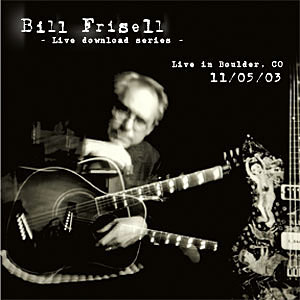 Bill Frisell #006: Recorded Live in Boulder, CO 11/05/03 Songline/Tonefield Productions 2009
Bill Frisell #006: Recorded Live in Boulder, CO 11/05/03 Songline/Tonefield Productions 2009Amidst all the Americana music, Frisell has made clear that his folkloric interests extend far beyond the lower 48 states. His aptly named The Intercontinentals (Nonesuch, 2003) brings together musicians from around the globe—with friends Scheinman and Liesz joined by Malian percussionist Sidiki Camara, Brazilian guitarist/multi-instrumentalist Vinicius Cantuária, and Greek Macedonian oudist Christos Govetas. Live Download Series #006 is one of the few shows in the series taken from a tour in specific support of a record, with the identical personnel. It's also a rarity in that most of the set list is actually culled from the album, with 11 of The Intercontinentals' 14 tracks represented in this two-disc, 15-song, two-hour download, though in every case but the relatively structured miniature, "The Young Monk," the sextet stretches the material beyond the studio versions' confines.
The interaction of strings and percussion makes for a particularly appealing sound on the vamp- based, roots-driven "Boubacar," while vocal tracks such as Cantuária's elegant "Perritos" bring a new complexion to Frisell's overall oeuvre. But the most revealing track is the old Smokey Robinson and the Miracles hit, "I Heard It Through the Grapevine"—by this time a staple in the repertoire of Frisell's trio with Scherr and Wollesen. There may be no funky bass or backbeat-driven drum set, but as The Intercontinentals does on its more world-centric material, so, too, does it work a groove here—in the pocket, and proving that the term "world music" is really a misleading catch-all phrase. In Frisell's world, all music, in the final analysis, is world music.
 Bill Frisell #007: Recorded Live in Seattle, WA 02/21/06 Songline/Tonefield Productions 2009
Bill Frisell #007: Recorded Live in Seattle, WA 02/21/06 Songline/Tonefield Productions 2009This is one of the more curious shows of the series. Frisell combines his Scherr/Wollesen trio with Scheinman/Kang/Roberts 858 group, for a 76-minute set drawing mostly from Unspeakable—though only three of the album's 14 songs are represented; the rest combines of group improvisation, a lengthy version of "You are My Sunshine" that references classical composers Gavin Bryars and Aaron Copland. Form meets freedom, as the familiar theme and changes lead to a middle section where Kang, in particular, demonstrates a combination of respect and healthy irreverence that explains why he's been a constant companion for Frisell, dating back to Quartet (Nonesuch, 1996) and right through to today for the guitarist's most recent release, Beautiful Dreamers (Savoy Jazz, 2010). The presence of a conventional rhythm section means that this version of "What's Going On" grooves more decidedly, but not until Frisell has set the stage with a combination of ethereal, loop-driven atmospherics and long string trio tones.
Some of Frisell's inherent appeal rests on the skewed edge he brings to everything he approaches; he's a rare guitarist who can take a standard chord, and turn it on its side by moving but a single note up or down a semitone. Jagged and noisy, the intro to Unspeakable's opener, "1968," combines angular harmonics, scraped strings and an apparent chaos of cross-rhythmic complexity—apparent, because the group manages to magically coalesce a mere minute into this 20-minute version of an originally four-minute tune that's as propelled by Wollesen's Jim Keltner- like backbeat, as it is the group's collective interplay, pushing the song towards a thundering climax, and a seamless morph into a faster than usual version of The Intercontinentals' "Baba Drame."
What's, perhaps, most remarkable about this Unspeakable sextet is its ability to seamlessly marry structure and liberated thinking; these are not traditional, improvisation-averse classical string players, and so there's collective interpretation and empathic interplay taking place throughout, even in its approach to linking defined songs together with freely improvised segue sections. As capable as the group is of propulsive material, it's as sweet as can be on Frisell's closer to Unspeakable, "Good Bye, Good Bye, Good Bye," here almost exactly the same length and following a similar structural roadmap, but, without Hal Wilner's samples and turntables, reliant on Frisell's mad scientist bag of effects to lend it its otherworldly complexion.
 Bill Frisell #008: Recorded Live in New York, NY 09/26/96 Songline/Tonefield Productions 2010
Bill Frisell #008: Recorded Live in New York, NY 09/26/96 Songline/Tonefield Productions 2010Here's another unusual entry—Frisell's titular group from 1996's Quartet, but here expanded to a quintet with the addition of Don Byron, who'd been a regular Frisell partner since the guitarist's Have a Little Faith (Elektra/Nonesuch, 1993) and the clarinetist's own milestone, Tuskegee Experiments (Elektra/Nonesuch, 1992). Quartet represented a significant stylistic shift for Frisell; with the dissolution of his longstanding trio with Kermit Drisoll and Joey Baron, the guitarist decided, at least for a time, not to try and replace the format; instead, opting for a rhythm section-less group with Eyvind Kang, trombonist Curtis Fowlkes and cornetist Ron Miles.
Unlike #006, which presented an album tour that culled most of its material from the album, here Frisell's Quartet+1 only covers four songs from the album, looking to other sources, including a skewed New Orleans-centric version of "The Rain in Spain," from the hit 1956 Broadway musical My Fair Lady, with Byron's bass clarinet soaring across its full register; a curious version of Rambler's "Strange Meeting," where Byron's bass clarinet acts as both bass line and rhythmic anchor; and an early version of Nashville's "We're Not From Around Here" that, again, proves the inherent flexibility of Frisell's writing to fit into any context, whether it's the brass-heavy version here or the more bluegrass-informed take on the studio album from the following year.
In concert, the quartet's ability to seamlessly shift responsibilities like a well-honed tag-team is all the more incredible for its doing so, at least some of the time, without the benefit of structure and, instead, from in-the-moment and intuitive decision-making. Frisell had, by this time, struck up a friendship with The Far Side cartoon creator, Gary Larson, and much of Quartet's music was written for a television special. In addition to the knotty and cartoonishly melodramatic "Tales from The Dark Side," the surprisingly ambling "Dead Ranch" and more brooding "Bob's Monsters" are included in this hour-long set that demonstrates Frisell's own twisted musical approach as a perfect dovetail for Larson's dry satire.
 Bill Frisell #009: Recorded Live in New York, NY 10/12/92 Songline/Tonefield Productions 2010
Bill Frisell #009: Recorded Live in New York, NY 10/12/92 Songline/Tonefield Productions 2010Also from New York, but recorded four years earlier, Download Series #009 predates Frisell's 1994 masterpiece, This Land, but finds that album's sextet—Driscoll and Baron augmented by Fowlkes, Byron and alto saxophonist Billy Drewes—performing the month before the album was recorded, and clearly working the material in preparation for its pending studio session.
The 75-minute set brings together half of This Land's 14 tunes, and is a perfect lesson in the difference between what works live, and what works in the studio. In some ways, live recordings go against their being moments in time that, once past, are gone forever, as opposed to studio recordings, where the goal is to create music that intentionally stands the test of time. Of course, many live recordings do stand the test of time—and this, along with the rest of the Live Download Series, is one. But comparing the extended versions here—the knottily freewheeling, 18-minute version of "Resistor," at nearly triple the length of the take on This Land—makes a strong case for greater concision when aiming to create the definitive studio version.
The carrot of this download is "Don's Fave," a previously unreleased Frisell tune that appears nowhere else in the guitarist's extensive catalog. Why it didn't end up on This Land is a mystery, as its serpentine changes and powerful delivery would have easily fit on an album that, nearly 20 years later, remains a high watermark for Frisell as a composer and bandleader. Before he went the Americana route and began exploring roots music, This Land's references to quintessential American composers like Copland, Charles Ives, and Julius Hemphill, makes it equally a quintessentially American record.
 Bill Frisell #010: Recorded Live in Oakland, CA 0715/89 Songline/Tonefield Productions 2010
Bill Frisell #010: Recorded Live in Oakland, CA 0715/89 Songline/Tonefield Productions 2010Live Download Series #010 travels back another three years behind #009, to the time when Frisell made the break from his early days at ECM, and the start of what would become a two-decade run for Nonesuch. It also further demonstrates the fundamental difference between live and studio recordings. "Unscientific American," which appears here long before Frisell would record it as a structured, 48-second miniature on This Land, is a more expansive eight-minute piece, where its idiosyncratic theme acts as a jumping-off point—and, mid-piece, rallying point—for collective improvisation, while Lookout for Hope's "Hangdog," this set's opener, goes to far more extreme places than its studio counterpart; Frisell's overdubbing replaced by a repeated bass/cello pattern that drives an overdriven guitar solo, far edgier and expressionistic than anything he's done in recent years.
With other material from Lookout and Rambler, the high point of the 80- minute set is the extended version of "High Planes Drifter," from Frisell's Elektra/Nonesuch debut, 1989's Before We Were Born. Arranged by the New York Downtown scene's influential John Zorn, it reflects a very different Frisell from what came before...and what would come after. During Frisell's own New York days, he moved away from the ethereal atmospherics of some of his earlier ECM work, towards a more aggressive tendency that, nevertheless, reflected the almost geeky idiosyncrasies of a guitarist as capable of ear-shattering shredding as he was moody tone poems—a broader range of expressionism that was prerequisite for his membership in Zorn's Naked City. Still, the episodic "High Plains Drifter"—with its rapid section-to-section shifts that reflected Zorn's own writing at the time—is all Frisell. There may be harsher sonics, harder surfaces and more jagged edges than his later work—this was before he developed a love affair with looping—but there are still plenty of signposts of what would come, including direct allusions to country and roots music, albeit delivered in a high-velocity, cartoon-like fashion.
There are those who still bemoan Frisell's loss of edge, and certainly the material here serves to justify those thoughts. Even "One Week (Theme)"—ultimately part of a larger project, where the guitarist scored three films by slapstick comedian Buster Keaton, released on Go West and The High Sign/One Week, both on Elektra/Nonesuch—is played with greater strength than on the album to come six years down the road. But this lengthy look at the film's theme also hints at the direction Frisell would be taking, even as "Devil Suit," from Go West, finds Frisell, Roberts and Driscoll layering the languid theme over Baron's tumultuous drumming. An early look at This Land's lyrical and slightly reggae-ish "Amarillo Barbados" shows that there has always been a straight line running through Frisell's career, a line that the entire Live Download Series brings into sharper focus.
 Bill Frisell #011: Recorded Live in Budapest, Hungary 03/29/03 Songline/Tonefield Productions 2010
Bill Frisell #011: Recorded Live in Budapest, Hungary 03/29/03 Songline/Tonefield Productions 2010A tour featuring a reduced, hornless version of Frisell's band for 2001's Blues Dream (Nonesuch) finds the guitarist exploring a cross-section of material, ranging from more propulsive and direct versions of The Intercontinentals' "Boubacar" and "Eli," to an early version of the folkloric "Lost Highway," first heard on the download-only Further East (2005), and a lengthy look at Blues Dreams' spare, bass-driven "Ron Carter."
Frisell also looks back at the eminently memorable "Monroe," from Good Dog, Happy Man (Nonesuch, 1999)—one of his best (if not the best) pure Americana records to date. Frisell rarely travels with an acoustic guitar these days, so it's a treat to hear him meshing organically with Liesz's dobro, propelled with the unshakable team of Wollesen and bassist David Piltch. Live Download Series #011's appeal is, in fact, the preponderance of acoustic material, including a version of Hank Williams Sr.'s "Your Cheating Heart" that swings with country elegance.
Back on electric, Frisell proves his skill at finding good music in less-than-likely places and shaping it to his own musical sphere, as he delivers a version of Nine Inch Nails mastermind Trent Reznor's "Hurt" that's about a different kind of pain; one less about angst and more about introspective, existential suffering, though it does build to a greater climax, with Wollesen and Piltch driving the beat and Frisell and Liesz hovering around each other, throughout the song's three-chord cycle. Two flat-out acoustic country tunes—Johnny Cash's "Tennessee Flat Top Box" and Hank Williams, Sr.'s "I'm So Lonesome I Could Cry" lead to a version of "I Heard It Through the Grapevine" that, with Liesz' occasionally Leslie'd electric guitar and Wollesen's visceral back beat, stands as Frisell's definitive version of this classic R&B hit.
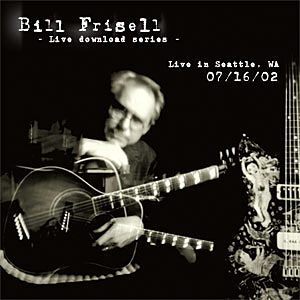 Bill Frisell #012: Recorded Live in Seattle, WA 07/16/02 Songline/Tonefield Productions 2010
Bill Frisell #012: Recorded Live in Seattle, WA 07/16/02 Songline/Tonefield Productions 2010Another unusual collaboration: the same front line as on #001—Frisell, Jenny Scheinman and Ron Miles—but without a rhythm section, and as part of a project that includes visual animation by Jim Woodring, the artist responsible for a number of Frisell's CD covers including Gone, Just Like a Train and Bill Frisell with Dave Holland and Elvin Jones. At the start of the performance, Frisell says, "I just can't do it; I was gonna explain what we're gonna do, but now that I'm up here, in front of you all, I just can't do it. So you'll just have to...figure out for yourselves."
The good news is that this download also includes video files, so it's possible to see Woodring's animation accompanying Frisell's music, which includes music from Bill Frisell, Ron Carter, Paul Motian ("Worse and Worse") and History, Mystery ("Faces" and "Lazy Robinson"). But beyond the unusual instrumentation of guitar, cornet and violin, it's the presence of three more tunes that have not shown up on any of Frisell's other recordings to date—the dark-hued "Mandala," comedic "Frogs" and countrified closer, "Whim Grinder"—that make this yet another essential download.
Frisell has always been about tone, dating back to ECM recordings like Arild Anderesen's Molde Concert (1982) and Jan Garbarek's Wayfarer (1983), but by this time a combination of technological advancements and a clearer vision of the moving target of a sound to which he, like so many musicians, constantly aspire, gives him a clearer and more orchestral palette from which to work. It's hard to imagine that these three instruments can create such a broad soundscape, but they do, making this Live Download Series installment one of Frisell's most intimately revealing.
 Bill Frisell #013: Recorded Live in Tokyo, Japan 07/21/00 Songline/Tonefield Productions 2010
Bill Frisell #013: Recorded Live in Tokyo, Japan 07/21/00 Songline/Tonefield Productions 2010The most recent installment in the Live Download Series returns to the trio that Frisell counted on for much of his touring in the early part of the 21st century—especially if the budget was small and it wasn't practical to bring a larger ensemble. Frisell, Tony Scherr and Kenny Wollesen were still relatively new friends at the time of this recording, and wouldn't actually get documented as a unit until five years later, when East/West was released—much as the guitarist's most recent drummer, Rudy Royston, wouldn't show up on record until 2010's Beautiful Dreamers (Savoy, 2010), despite playing with Frisell since 2007.
The set list is relatively cross-sectional, dating as far back as In Line's dark-hued "Throughout" to more recent music from Good Dog, Happy Man, like the traditional "Shenandoah" and funkier "Big Shoe"; Gone, Just Like a Train's relentless "Blues for Los Angeles"; and Nashville's curious "Mr. Memory." There's also a smattering from Blues Dream, including the shorter, atmospheric title track, leading into an hypnotic version of "Ron Carter," where Scherr's robust bass provides a solid foundation over which Frisell layers loops, strange otherworldly sounds, and the smoothly overdriven tone he'd begun to favor over that of his sharper-edged New York days.
The highlight of the two-disc, 93-minute set is, however, a version of John McLaughlin's "Follow Your Heart," which also appears on #004, with Frisell's unrecorded trio with Sam Yahel and Brian Blade. Frisell had, in fact, been playing this tune as far back as 1997, when he was touring with the Quartert group. In contrast to the organ trio's lighter-complexioned version, Scherr and Wollesen dig in hard, pushing Frisell's overdriven guitar to extremes that once speak against any perceived loss of edge. If Cream had an acoustic bass, and a drummer with a stronger predilection for behind the beat playing, it might have sounded something like this—though Frisell plays with greater sophistication than Eric Clapton ever has, and—and considerably more constraint, to boot.
Providing an encapsulated, download-by-download look at Frisell's Live Download Series might be construed as some kind of end-point, but the truth is that Frisell is as busy as he's ever been. There's a new record just out, that reunites him with The Inntercontinentals' Vinicius Cantuaria—Lagrimas Mexicanas (Ent. One, 2011)—and another Savoy Jazz recording on the horizon, with his 858 Quartet. With plenty of other recorded shows, with other groups, in the can, and 2011 tours already lined up to include shows with Cantuaria; solo performances; a trio with Ron Carter and Joey Baron; the Beautiful Dreamers trio, with Eyvind Kang and Rudy Royston; some dates guesting with piano legend McCoy Tyner; the Disfarmer Project; and a special show, "Bill Frisell Trio featuring Tony Scherr and Kenny Wollesen takes on Keaton, Woodring and Morrison"—and that's only through to April—it looks like there'll be plenty of music to choose from, to keep the Live Download Series alive and active for years to come.
Tracks and Personnel:
#001: Bochum, Germany 05/22/04
Tracks: Lazy Robinson; Blues for Los Angeles; Lonesome; Worse and Worse; Ventura; Masters of War.
Personnel: Bill Frisell: guitar; Ron Miles: cornet; Jenny Scheinman: violin; Viktor Krauss: bass; Matt Chamberlain: drums.
#002: San Francisco, CA 03/16/07
Tracks: A Change is Gonna Come; Crepuscule with Nellie; Misterioso; Improvisation #1; Hard Times; My Man's Gone Now; Masters of War; A Hard Rain's A-Gonna Fall; Evidence; Improv #2/I Left My Heart in San Francisco; Ventura.
Personnel: Bill Frisell: guitar.
#003: San Francisco, CA 02/05/05—Set 2
Tracks: Hymn for Ginsberg; Pretty Polly; Baba Drame; 858-5; 858-6; 858-7; I'm So Lonesome I Could Cry; What's Going On; Cluck Old Hen; What the World Needs Now.
Personnel: Bill Frisell: guitar; Hank Roberts: cello; Jenny Scheinman: violin; Eyvind Kang; viola.
#004: New York, NY 05/01/04—Set 3
Tracks: Lost Highway; Throughout; S.K.J.; Strange Meeting; Richter 858-7/858-8; Follow Your Heart.
Personnel: Bill Frisell: guitar; Brian Blade: drums; Sam Yahel: organ.
#005: London, UK 11/15/05
Tracks: CD1: Improvisation #1; Across the Universe; Improvisation #2; Beautiful Boy; You've Got to Hide Your Love Away; Improvisation #3; #9 Dream; Revolution. CD2: In My Life; Julia; Please Please Me; Come Together; Nowhere Man.
Personnel: Bill Frisell: electric guitar; Greg Liesz: pedal steel, acoustic guitar; Jenny Scheinman: violin.
#006: Boulder, CO 11/05/03
Tracks: CD1: Boubacar; Listen; Magic; Eli; Yaya; Perritos; The Young Monk; Ligia; Djembe Solo. CD2: Improvisation #1; Good Old People; Baba Drame; Procissao; I Heard It Through the Grapevine; We Are Everywhere.
Personnel: Bill Frisell: electric and acoustic guitar; Greg Liesz: pedal steel; Jenny Scheinman: violin; Christos Govetas: oud, vocals, bouzouki; Sidiki Camara: percussion, vocals; Vinicius Cantuaria: acoustic guitar, vocals.
#007: Seattle, WA 02/21/06
Tracks: Improvisation #1; You Are My Sunshine; Improvisation #2; 1968; Alias; Good Bye, Good Bye, Good Bye; What's Going On.
Personnel: Bill Frisell: guitar; Tony Scherr: bass; Kenny Wollesen: drums; Hank Roberts: cello; Jenny Scheinman: violin; Eyvind Kang: viola.
#008: New York, NY 09/26/96
Tracks: Improvisation #1; Tales From The Far Side; The Rain in Spain; Strange Meeting; Improvisation #2; We're Not From Around Here; The Gallows; Dead Ranch; Bob's Monsters.
Personnel: Bill Frisell: electric guitar; Ron Miles: cornet; Eyvind Kang: viola; Curtis Fowlkes: trombone; Don Byron: clarinets.
#009 New York, NY 10/12/92
Tracks: Monica Jane; carton; Julius Hemphill; Rag; Don's Fave; Is It Sweet?; Jimmy Carter pt. 2; Resistor.
Personnel: Bill Frisell: electric guitar; Curtis Fowlkes: trombone; Don Byron: clarinets; Billy Drewes: alto saxophone; Kermit Driscoll: bass; Joey Baron: drums.
#010 Oakland, CA 07/15/89
Tracks: Hang Dog; When We Go; Hard Plains Drifter; One Week (Theme); Unscientific Americans; Drum Solo; Devil Suit; Alien Prints; Amarillo Barbados; Hello Nellie.
Personnel: Bill Frisell: electric guitar; Hank Roberts: cello; Kermit Driscoll: bass; Joey Baron: drums.
#011 Budapest, Hungary 03/29/03
Tracks: Boubacar; Improvisation; A Hard Rain's A-Gonna Fall; Ron Carter; Lost Highway; Monroe; Eli; Your Cheatin' Heart; Hurt; That Was Then; Tennessee Flat Top Box; I'm So Lonesome I Could Cry; I Heard It Through the Grapevine.
Personnel: Bill Frisell: electric and acoustic guitar; Greg Liesz: pedal steel and dobro; David Piltch: bass; Kenny Wollesen: drums.
#012 Seattle, WA 07/16/02
Tracks: Introduction; Worse and Worse; Faces; Lazy Robinson; Mandala; Frogs; Whim Grinder.
Personnel: Bill Frisell: electric guitar; Ron Miles: cornet; Jenny Scheinman: violin; Jim Woodring: visual animations.
#013 Tokyo, Japan 07/21/00
Tracks: CD1: Throughout; Improvisation; Blues for Los Angeles; Keep Your Eyes Open; Blues Dream; Ron Carter. CD2: Shenandoah; Follow Your Heart; Hard Times; That Was Then; Big Shoe; Twenty Years; Mr. Memory.
Personnel: Bill Frisell: electric and acoustic guitar; Tony Scherr: bass; Kenny Wollesen: drums.
Photo Credit Juan-Carlos Hernandez
DS#001-013 | DS#014-017
Tags
Bill Frisell
Multiple Reviews
John Kelman
United States
Hank Roberts
Kermit Driscoll
Joey Baron
Kenny Wollesen
Sam Yahel
Brian Blade
Jenny Scheinman
The Beatles
John Lennon
Ron Miles
Viktor Krauss
Bob Dylan
Jan Garbarek
Arild Andersen
Thelonious Monk
Dave Holland
Elvin Jones
Joshua Redman
Wayne Shorter
Milt Jackson
john mclaughlin
Paul McCartney
Colin Towns
Don Byron
CURTIS FOWLKES
john zorn
Rudy Royston
Eric Clapton
McCoy Tyner
PREVIOUS / NEXT
Bill Frisell Concerts
Mar
29
Sun
Jun
7
Sun
Support All About Jazz
 All About Jazz has been a pillar of jazz since 1995, championing it as an art form and, more importantly, supporting the musicians who make it. Our enduring commitment has made "AAJ" one of the most culturally important websites of its kind, read by hundreds of thousands of fans, musicians and industry figures every month.
All About Jazz has been a pillar of jazz since 1995, championing it as an art form and, more importantly, supporting the musicians who make it. Our enduring commitment has made "AAJ" one of the most culturally important websites of its kind, read by hundreds of thousands of fans, musicians and industry figures every month.



